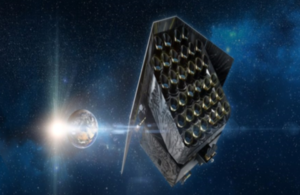PLATO (PLAnetary Transits and Oscillations of stars)
PLATO is an ESA medium class science mission to detect rocky Earth-like planets orbiting bright nearby Sun-like stars in the ‘habitable zone’, where liquid water could exist on the planet surface.

PLATO Spacecraft design concept showing multiple cameras [Credit: OHB System]
PLATO will use a telescope comprised of 24 ‘normal’ cameras and 2 ‘fast’ cameras, resembling an insect’s compound eye, to provide the necessary combination of precision and wide field of view. Together, the cameras will be able to image about 5% of the sky at once.
It will conduct ultra-precise, uninterrupted photometric observations of candidate stars over a period of several years, to detect tiny dips in the light coming from them as candidate exoplanets transit in front of them.
It will also measure minute ‘wobbles’ of the stars caused by the gravitational pull of candidate exoplanets orbiting them.
In this way PLATO will seek to identify candidate exoplanets which may have some similarities to Earth. When candidates are identified, it is expected that ground-based telescopes and NASA’s James Webb Space Telescope (JWST) will be used to examine and characterise them further, including analysing their atmospheres looking for life markers such as oxygen, ozone and carbon dioxide.
PLATO is due to launch in 2026 for a 4.5-year nominal mission
How is the UK involved?
The UK has lead roles on PLATO. Professor Don Pollacco from the University of Warwick leads the PLATO Science Management team and sits on the PLATO Consortium Board.
In addition to the science management at Warwick, UCL’s Mullard Space Science Lab is leading the design and build of the electronics for the cameras, and the CCD detectors are being manufactured under contract to ESA by Teledyne e2v in Chelmsford.
The University of Cambridge is leading a UK consortium to develop the UK PLATO Data Centre.
The University of Birmingham, Open University, University of Oxford and University of St Andrews are also contributing to the Science Management activities and Data Processing Centre.
Securing lead roles on both the PLATO hardware development and ground segment ensures that UK researchers remain at the forefront of world class scientific research. The science lead role on PLATO will secure maximum science return on UK investment from the space data produced by this cutting-edge science mission, building on UK research strengths and allowing the UK to maintain its international competitiveness in world class scientific research. The search for planets which could support alien life will generate significant public interest and outreach opportunities, encouraging uptake of STEM subjects and inspiring the next generation of UK researchers and engineers
The UK Space Agency has invested £25 million to support the development and build phase of PLATO during 2017 to 2024.
Thales Alenia Space (TAS) UK has been selected as a partner for the industry prime contractor OHB, who will build the spacecraft platform and the service module for the science instrument. TAS UK will have involvement in the avionics development and the service module integration.